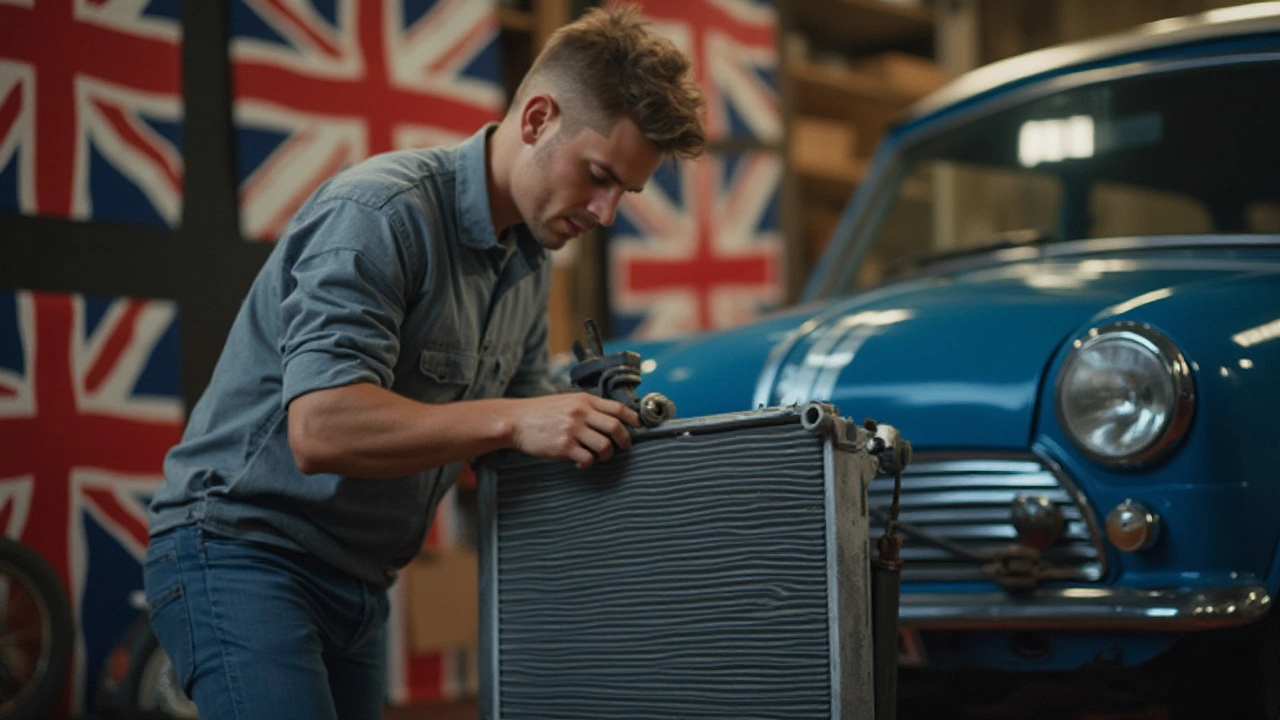Driving a car is as much about adventure as it is about ensuring that the vehicle remains in peak condition. A vital component under the bonnet, often overlooked until disaster strikes, is the car's radiator. This essential part keeps your engine at a happy medium, neither too hot nor too cold, ensuring that your journey is smooth and trouble-free.
But how long can you expect a radiator to last in your trusty vehicle? Well, that depends on several things, from how often you drive to the roads you travel, and how well you keep up with maintenance. In this article, we'll explore these aspects in detail, helping you understand when you might need to start worrying about this unsung hero of the road. You'll also pick up some handy tips for extending the life of your radiator, ensuring that it serves you diligently for years to come.
- Understanding the Role of a Radiator
- Factors Influencing Radiator Lifespan
- Signs of a Failing Radiator
- Radiator Maintenance Tips
Understanding the Role of a Radiator
At the heart of your car's engine is a complex dance of explosions and movements, enough to generate serious amounts of heat. If not managed correctly, this heat can lead to disastrous outcomes for the engine, turning a potentially thrilling ride into a breakdown side of the road. Enter the humble radiator, the unsung hero that keeps this tempest in a teapot under control. The radiator's primary job is to cool the engine by transferring heat from the coolant that has been heated up by the engine. The coolant, usually a mixture of water and antifreeze, circulates through the engine, absorbing heat, before being pumped into the radiator where it releases the heat into the air. This process is more than just important, it's essential for avoiding engine overheating.
As the engine runs, the thermostat within opens up to allow coolant to exit and travel through the radiator. Here, the radiator employs thin metal fins, increasing surface area, to dissipate heat into the atmosphere. But that's not all; a fan located either right in front of or behind the radiator will pull or push air through it, aiding in cooling the engine further. But you should not dismiss the influence of external weather conditions. For example, if you are driving on a hot summer day, the radiator has to work overtime to offset the additional environmental heat. It's a tough job, but remarkably, radiators manage it with aplomb.
True to Manchester weather fashion, don’t forget about cold winter days where tasks are reversed. In this chilly atmosphere, the radiator regulates the engine's temperature, ensuring that the heat is gently cradled within the confines of the engine block before the coolant journeys back for a new cycle. However, consider the wear and tear over months and years. This isn’t just a tube and hole problem but more of a reminder that good maintenance is a key step to longevity. Regular check-ups can prevent rust and leaks from doing silent harm. According to an analysis by the British Roadside Association, keeping your radiator in good nick might just save you from spending 50% more on repairs down the line.
"A well-maintained radiator will not only ensure the car's efficient performance but also extend its lifespan," says automotive engineer Liam Groves. He adds, "Regular checks and maintenance to car radiators could reduce breakdowns significantly, especially during seasonal extremes."
When considering what affects the lifespan of car radiators, many factors come to mind. The journey is not just about the miles covered but also how those miles are accumulated. City driving, with its stop-and-go traffic, can be more taxing on a radiator than those endless stretches down the motorway due to the frequent changes in speed, gear shifting, and braking. Regularly driving in dusty environments like construction zones can also impact efficiency, clogging the fine channels that allow free passage of coolant and air. That's why understanding the potential pitfalls and tending to them preemptively cannot be overstated.
As technology progresses, radiators have become more efficient and reliable, but they are not invincible. Recognizing their role could be your first step in preventing costly replacements. So take a good look under the bonnet next time, because without this hard-working friend, your car may just have to retire sooner than you'd like.

Factors Influencing Radiator Lifespan
Car radiators are like the unsung backstage heroes of the mechanical world. Keeping your engine cool and collected, they operate in the background, often unnoticed. The lifespan of a car radiator is not set in stone, and several factors can tip the scales from a brief performance to a long-standing act. First and foremost, the type of driving you do plays a significant role. Those who frequently find themselves stuck in traffic might see their radiators work overtime, compared to someone cruising along open highways. Stop-start traffic can increase the stress on the cooling system, causing wear and tear much quicker than sustained high-speed travel. Materials used in the manufacturing of your radiator also contribute to its longevity. Aluminum radiators, widely appreciated for their lightness and superior heat dissipation, often last longer than their copper counterparts, which might fall prey to corrosion quicker, depending on the coolant used.
Another critical factor is the quality and frequency of maintenance on your vehicle. Just like a garden that requires regular watering, a radiator's life can be extended with simple, routine care. Flushing the cooling system is one such nurturing activity. Many manufacturers recommend doing it every 30,000 miles, ensuring any built-up sediment or rust is swept away. The climate in which you drive also makes a difference. In warmer regions, where engines are consistently challenged by higher temperatures, radiators might lose their sheen faster. Coupled with humid conditions, there’s a higher risk of corrosion, potentially reducing their lifespan. On the durability front, many experts suggest that a radiator will typically last six to ten years, but this can vary wildly depending on the aforementioned conditions.
Some interesting considerations also arise when talking about radiator lifespan. According to car expert James Malo, "The care and type of coolant used are two of the single most important aspects of keeping your radiator healthy."
If you use an inferior coolant, it might save you money initially, but can shorten the life of your radiator significantly.Thus, it's wise to invest in a high-quality coolant, and importantly, to mix it in the right proportions. Lastly, accidents or inconsistencies in the road can impact the radiator inadvertently. Imagine a sudden hit from debris on the road. Even if the hit doesn’t appear to damage anything visibly, there remains a chance of minor, undetected damage to the radiator, which might lead to problems down the road. Be mindful of such factors when maintaining your vehicle, and you'll likely get more miles out of your trusty radiator.

Signs of a Failing Radiator
When it comes to keeping your engine cool, the car radiator plays an indispensable role. Knowing the signs of a failing radiator can save you from more significant headaches down the line. One of the most common indications of radiator trouble is visible leaks. If you find green, yellow, or orange fluid puddles beneath your car, your radiator might be leaking. This liquid is typically coolant, which is supposed to be circulating within the radiator and throughout the engine, not leaking onto your driveway.
Another telltale sign is an overheating engine. If your car's temperature gauge consistently moves into the danger zone, even on short trips or moderate days, it might be yelling for radiator help. A faulty radiator cannot adequately balance the cooling system, leading to an engine that becomes too hot and risks severe damage. Strange noises too can signal radiator problems. Unusual sounds like hissing or the faint whistle of air can indicate air bubbles trapped in your radiator, hampering its performance.
Look out for radiator sludge, a serious issue that can stem from rust or debris build-up. This normally happens when old coolant isn't replaced regularly, causing contamination. When this situation arises, the sludge can block the flow of coolant, leading to inefficient heat dissipation. In some cases, a sudden drop in your coolant levels might suggest a problem. This is important as coolant doesn’t evaporate quickly under normal conditions. Consistently low coolant could be a strong warning that your radiator needs attention.
According to Peter Philippi from Auto Technician Guild, "A properly functioning radiator is essential for vehicle longevity and performance. Ignoring early signs of radiator failure can lead to more expensive repairs down the line."
A significant drop in efficiency, such as lower fuel mileage, could also be linked to radiator issues. When the engine doesn’t cool properly, it doesn’t run as efficiently, which hurts overall vehicle performance. Ultimately, regular inspection and upkeep will keep your radiator working at maximum efficiency. Catching these signs early and addressing them promptly will ensure your radiator doesn’t fail you when you least expect it.

Radiator Maintenance Tips
Your car's radiator is quite the unsung hero in your vehicle's ecosystem, ensuring everything runs without overheating. To maximize the life of your car radiators, a bit of attention and care go a long way. One of the simplest steps is to keep an eye on the coolant level. Regularly check and top it off if necessary. Coolant acts like the lifeblood of your radiator, keeping the engine from overheating or freezing up in extreme weather. Checking this monthly isn't excessive—consider it a bit of tender loving care for your car.
Another key aspect of radiator maintenance is ensuring that coolant quality is up to par. Dirty or degraded coolant can hinder performance and even lead to corrosion inside the radiator—quite the unwanted guest! Drain and replace the coolant every 30,000 miles or as recommended in your car's maintenance schedule. This isn't just a suggestion; it's essential to prevent buildups that can clog the radiator and lead to overheating.
Flushing the radiator regularly is another secret to extending its life. This involves completely draining the existing coolant and cleaning the entire system before refilling it, thus removing impurities and rust particles. Aim to do this every couple of years. Don’t be deterred; it's a bit like giving your radiator a spa day, which is occasionally necessary for such hardworking components. Ignoring this can lead to inefficient radiator function and potential engine damage.
“The secret of car longevity often lies in the basics of maintenance—keeping it simple and regular makes all the difference,” says auto expert James Whitlock. Indeed, ignoring these fundamental aspects can lead to more costly repairs down the line.
Moving beyond the coolant, look at the radiator cap. Yes, that's right—the little cap plays a big role in maintaining pressure. Check it periodically to ensure it seals correctly. A faulty cap can't maintain pressure, leading to overheating and potential engine damage. You should replace it every five years even if it seems okay.
Lastly, conduct visual inspections. Look out for any leaks, rust, or damage. Don't wait until the car is smoking on the highway before you pay attention! Use a flashlight to peer into the radiator and look for any signs of wear or obstruction. Keeping the fins clean and free of debris is another crucial step. Utilize a soft brush or simply spray them gently with water to clear away dirt and leaves.
| Maintenance Task | Recommended Frequency |
|---|---|
| Coolant Level Check | Monthly |
| Coolant Replacement | Every 30,000 Miles |
| Radiator Flush | Every 2 Years |
| Cap Replacement | Every 5 Years |
By embedding these maintenances into your routine, you ensure your car radiators serve reliably. Not only does this save you from sudden breakdowns, it also preserves the overall health and efficiency of your vehicle. A little extra care really can keep you on the road with confidence.

